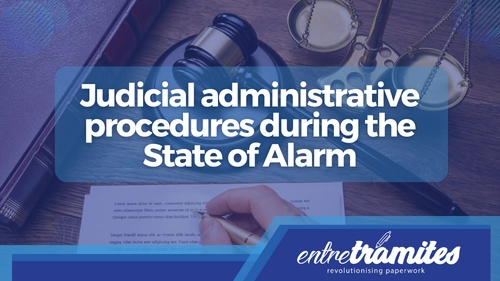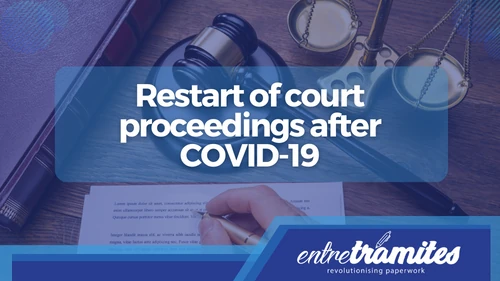All judicial and administrative procedures are paralyzed as a result of the State of Alarm, caused by the COVID-19 health crisis. The Public Administrations, the General Council of the Judiciary, and the Ministry of Justice have issued statements defining the measures that will be taken in their respective areas.
To prevent the rights of those applicants and/or claimants of judicial/administrative procedures from being affected by the situation, Royal Decree 463/2020, of March 14, announcing the State of Alarm for the management of the health crisis caused by COVID-19 stipulates the suspension of the deadlines for judicial and administrative procedures, as well as those of prescription and expiration of the legal deadlines for the exercise of all types of actions.
Deadlines for judicial procedures
The second additional clause of the aforementioned Royal Decree establishes that:
“Terms are suspended and the time periods provided for in the procedural laws for all jurisdictional orders are suspended and interrupted”.
The precept also states that the calculation of deadlines will resume at the time this Royal Decree loses validity, that is when the exceptional State of Alarm ends. However, legal professionals (especially lawyers and prosecutors) need a statement that clarifies how they should proceed on the Lexnet Platform, the system for managing electronic notifications with the courts.
Exceptions
The criminal laws specify that this suspension or interruption will not apply to habeas corpus proceedings, actions entrusted to custody or guard services, actions that involve a detainee, protection orders, urgent actions regarding penitentiary surveillance, and any precautionary measure in matters of violence against women or minors. In addition, during the investigation phase, the competent judge or court may agree to carry out actions that cannot be postponed, due to their urgent nature.
As for the rest of the jurisdictional orders, the terms of some procedures considered as priority will not be interrupted, such as:
- The procedures for the protection of the Fundamental Rights of a Person, provided in Art. 114 et seq. of Law 29/1998, of 13 July, regulating the Contentious-Administrative Jurisdiction, or to the processing of the authorizations or judicial ratifications provided in Art. 8.6 of the aforementioned law.
- The procedures for collective conflict and for the protection of fundamental rights and public liberties, regulated in Law 36/2011, of October 10, on Social Jurisdiction.
- The judicial authorization for non-voluntary internment due to mental disorder, which is provided in Art. 763 of Law 1/2000, of January 7, on Civil Procedure.
- The implementation of measures or provisions for the protection of minors, which are provided in Art. 158 of the Civil Code.
However, the judge or court in charge of civil, commercial, social, or administrative procedures, may agree to the practice of judicial actions that, “are necessary to avoid irreparable damage to the rights and legitimate interests of the parties in the procedures.”
Deadlines of administrative procedures
The deadlines for the processing of administrative procedures in Spanish entities are also suspended and interrupted (except those referring to facts justifying the State of Alarm), as provided in the third additional clause of the Royal Decree.
This measure affects the entire public sector defined in Law 39/2015, of October 1st, on the Common Administrative Procedures of Public Administrations.
It is also expected that the competent body will be able to allow “the management and instruction measures strictly necessary to avoid serious damage to the rights and interests of the interested party in the procedure.” To do this, the entity must first express its agreement.
Prescription and expiration of actions
Finally, the Royal Decree also deals with the terms of the actions. Thus, it stipulates in its fourth additional clause that the prescription and expiration periods of any type of actions and rights will be “suspended during the period of validity of the State of Alarm and, where appropriate, of the extensions that are implemented”.
Any doubts about these new regulations?
We want to listen to you and know what your questions are about the administrative procedures you have to carry out. Count on the advice of our experts to answer all your queries.
At Entre Trámites we invite you to know about all our services. Fill in our contact form and we will call you to help you as soon as possible, schedule a free online consultation, or simply text our WhatsApp.



